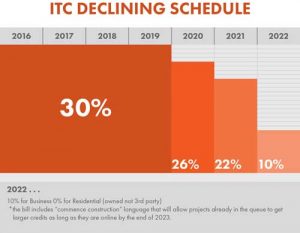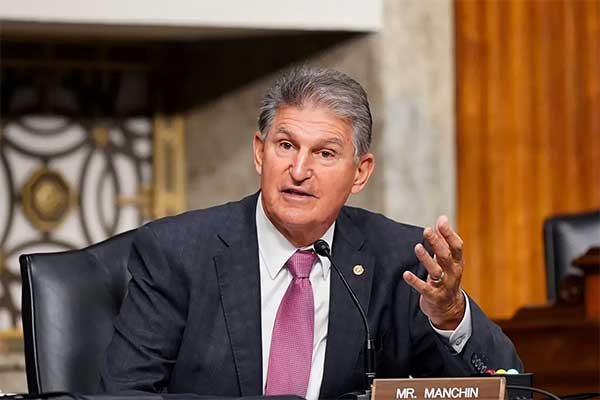- An unlikely but groundbreaking alliance has been forged between senior Democratic leadership and Senator Joe Manchin of West Virginia.
- This alliance promises an investment of $370 billion toward energy security and climate change. It includes an extension of the solar investment tax credit (ITC) at an impressive rate of 30% for ten years.
- Solar stocks jumped Thursday on the news.
In a surprise win for President Joe Biden and the Democratic Party ahead of the midterms — and the solar industry and other cleantech sectors in general — an agreement has been reached between senior Democratic leadership and Senator Joe Manchin regarding the “Inflation Reduction Act of 2022.”
Representing the United States’ most aggressive effort to combat climate change to date, this bill will see $370 billion invested into energy security and climate change measures. This is significantly more than the $90 billion included for clean energy incentives in President Obama’s 2009 American Recovery and Reinvestment Act.
Senator Joe Manchin of West Virginia — one of the top recipients of fossil fuel donations and the founder of Enersystems Inc., a coal brokerage business — has held up clean energy negotiations in recent weeks on account of supposed “inflationary spending” concerns. Between 2011 and 2020, the Democrat made between $4.9 million and $5.1 million from coal-related enterprises.
In the evenly divided 50-50 senate, Manchin’s vote has been key to the passage (or lack thereof) of the Democratic agenda.

In the U.S., both homeowners and businesses qualify for a federal tax credit equal to 26 percent of the cost of their solar panel system minus any cash rebates. The timeline for the eventual end of the ITC is in 2022.
This reconciliation bill — used to procedurally override senate filibuster rules — will also provide a long-term extension of the investment tax credit (ITC), which has been fundamental to ushering in the burgeoning American solar industry as it’s known today.
The credit applies to residential, commercial, and utility-scale developers and will discount 30% of the cost of solar installations for ten years (until 2033). Afterwards, the credit will decline to 26% and then again in 2034 to 22%. Whether co-located with solar energy or installed standalone, energy storage also qualifies for the credit.
The reinvigorated ITC will come with a variety of “adders,” which, if applied correctly as suggested by ROTH Capital Partners, could push the tax credit as high as 50% for some projects.
Additionally, the credit is equipped with a direct pay provision, allowing developers with little to no tax liability to treat it as a tax overpayment, resulting in a cash refund.
“We will improve our energy security and tackle the climate crisis — by providing tax credits and investments for energy projects. This will create thousands of new jobs and help lower energy costs in the future,” said President Biden.
Abigail Ross Hopper, president of the American Solar Energy Industries Association, hailed the announcement as revolutionary for the future of the American economy. “With long-term incentives for clean energy deployment and manufacturing, the solar and storage industry is ready to create hundreds of thousands of new jobs and get to work building out the next era of American energy leadership. This is a crucial window of opportunity that we cannot miss.”

Switching to renewable energy solves the problems of fuel and climate change, but not those of escalating resource use.
“Inflation and energy are [also] top of mind for Americans, and we have maintained that lawmakers must stay at the negotiating table and cut a deal on federal clean energy investments to help bring down the cost of electricity for homes and businesses,” she added.
It’s hard to overstate just how critical and transformative this climate legislation — particularly the ITC renewal and strengthening — will be once it passes the senate floor (which is set for next week). The legislation will unleash a prospering solar market ripe for blue-collar talent, help lower electricity bills, drastically cut emissions, and enhance American energy security at a perilous time in energy geopolitics.
While the American solar industry has witnessed sustained booms in the past, the Democrat’s new anti-inflationary spending package will unleash investment and growth in the industry unlike anything North American renewable energy professionals have seen prior.
As Tiernan Sittenfeld, senior VP with the League of Conservation Voters puts it — this is a “holy sh*t” moment for the fight against climate change and the American solar industry.
The stock market responded positively to the news as The Invesco Solar ETF added 9.6% on Thursday morning.
Residential solar installers Sunrun and Sunnova jumped 26% and 33%, respectively. SunPower gained more than 12%. SolarEdge and Enphase Energy each added more than 10%.













Comments